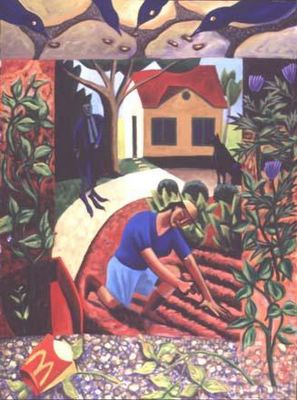One of my gardening references talked about "soil with good heart." The key to this, it said, was keeping the soil rotated and amended with lots of organic matter. It advocated a practice called double digging, which involves an annual process of digging, enriching and then refilling a series of trenches in your garden, lengthwise and then crosswise, until you've accomplished a very slow, labor-intensive equivalent of shoveling your garden soil into a giant bowl, adding big scoops of compost and manure, and then stirring it all together with a few dibs and dabs of minerals. The goal is to produce a balanced soil loose enough to aerate plant roots and allow them to grow, but substantial enough to feed the plants and retain needed moisture.
Today's Gospel lesson talks about seed -- the seed of the Gospel, of God's invitation to shalom -- that falls into good soil and yields an astonishing crop. How interesting that the same characteristics of good garden soil -- an internal "spaciousness" and ability to yield combined with substance and sustenance -- also describe the heart that is most hospitable to the indwelling of God. And note that the soil with the best potential to grow things is not fallow soil, but soil that's been mightily stirred up -- plowed and trenched and amended. Likewise, the hearts most receptive to God seem to be hearts that have been broken in some way, or perhaps in many ways.
But we don't hear anything in Jesus' parable about the sower's soil preparation. In fact, the farmer in this story doesn't seem to care very much about either efficiency or success. Contrary to the instructions in my gardening book, which talked about laying out my properly double-dug garden in a grid and carefully planting my seeds to maximize yield in a minimum of space, the sower in the parable just tosses the seeds anywhere and everywhere in what would seem to be random acts of agriculture and senseless acts of wastefulness. Remember -- Jesus is talking about God here: What does Jesus' illustration have to say about the generosity of God's grace and invitation into relationship? And what does it say about second-guessing God's "big picture" in making Godsself known? As many of us also heard in church today, "...my thoughts are not your thoughts, or my ways your ways." Perhaps one of the many lessons one can take away from this parable is that patches of good-hearted soil may lie in unexpected places; that there's method to God's madness.
Soil with good heart -- I think that is what we would all want to be, pray to be, in the Reign of God. But God transforms us all into sowers as well. Do we multiply our yield by scattering it with God's "irrational exuberance"? As Jesus reminds us more than once in the lesson today, listen -- listen! -- to the story.
"Four Soils," James B. Janknecht


1 comment:
I sat through two sermons on this very Gospel and you have managed to introduce yet another angle for looking at it.
(I was struck by the Psalm. I will try to put something in my own blog soonish ... have been away from the computer in the evenings.)
Post a Comment